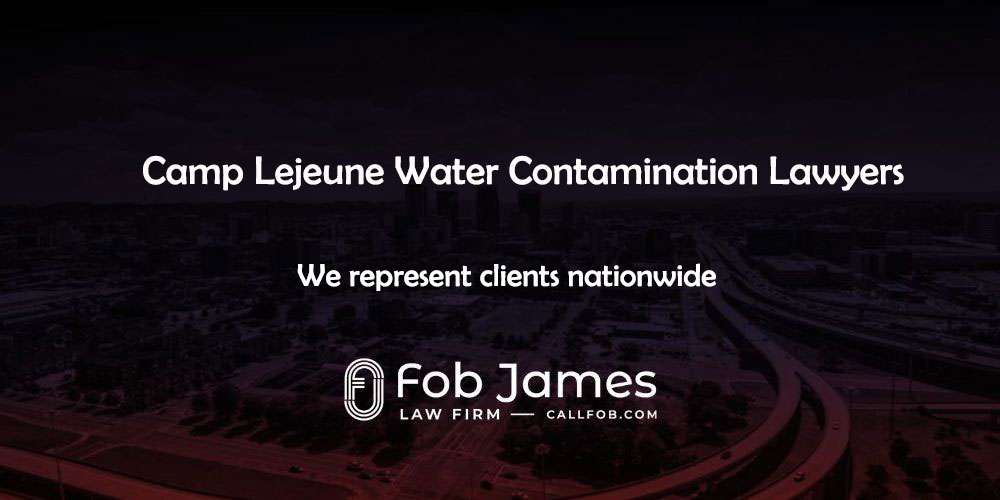
September 7, 2023: The Navy and the Department of Justice announced an expedited settlement process called the “Elective Option” for limited Camp Lejeune Justice Act claimants.
The internet has exploded with misinformation about what the Elective Option entails and who qualifies. The purpose of this blog is to break down the EO and provide a honest analysis of the same.
Here is the bottom line. The government has a voluntary settlement process limited to the “presumptive condition claims” at low settlement amounts. The settlement amounts are based on your injury and how long you were at Camp Lejeune.
The government wants to appeal to claimants who have strong claims that want “quick money”. In other words, “such a deal I have for you!”
In order to qualify for the Elective Option, you must meet specific requirements. The three main criteria in order to even be eligible are as follows:
- You must have been diagnosed or treated for one of nine presumptive conditions (see list below) before August 10, 2022;
- You must have received the diagnosis or treatment not less than two years after your first exposure and not greater than thirty-five years after your last exposure; and
- You must substantiate the time you were exposed at Camp Lejeune with military service records, tax returns, drivers’ licenses, pay stubs, employment contracts, or similar documentation.
Again, if your case does not meet these criteria then the Elective Option is not applicable to your case.
If you have any questions about the recently announced Elective Option, contact our experience Camp Lejeune attorneys. We cap our attorney fees at 20-25% of the recovery.
What is the Camp Lejeune “Elective Option”?
The “EO” guidance provides a fast track for settling certain qualifying cases without any significant workup or investigation.
The government claims the Elective Option framework is intended to settle certain Camp Lejeune Justice Act claims “quickly, equitably, and transparently” while avoiding the “burdensome” and “lengthy” litigation process.
In truth, at least based on our initial review of the guidance, the Elective Option framework appears to be a ploy by the government to reduce the overall number of claimants by offering expedited, guaranteed settlements for a limited number of individuals with certain qualifying illnesses/diseases.
Overall, the guidance is progress in the right direction, particularly since we are still very early in the litigation process. Although it is not best route for most, the EO process may be a preferred path for a very small number of claimants.
The fact the government is willing to waive VA/disability liens for these claimants is a promising start. However, victims or their family members whose lives were forever changed by this devastating occurrence are not adequately compensated by the settlement figures set forth in the guidance.
Does the Elective Option Apply to my Case?
Under the Elective Option framework, eligible claimants will receive settlements based on:
- their specific illnesses; and
- the duration of stay at Camp Lejeune.
Qualifying Illnesses
There are two “tiers” of qualifying illnesses under the framework.
| Tier 1 | Tier 2 |
| Kidney Cancer | Parkinson’s Disease |
| Liver Cancer | Multiple Myeloma |
| Non-Hodgkin Lymphoma | Kidney Disease / End Stage Renal Disease |
| Leukemias | Systemic Sclerosis / Systemic Scleroderma |
| Bladder Cancer |
Keep in mind that your claim does not lack merit if it is not included in these two tiers. It simply means you do not qualify for this expedited settlement process.
As noted in the guidance, these tiers are based solely on findings from the Agency for Toxic Substance and Disease Registry (the “ATSDR”). The government intends to make offers to other claimants beyond those listed in these tiers in the future as the litigation progresses.
Length of Time on Base
The only other factor considered under the EO framework is the claimant’s length of time on base at Camp Lejeune.
The “lowest” level is 30 days to 1 year on base, the “mid-level” is 1-5 years, and “top” level is more than 5 years.
Other necessary conditions to qualify
Note there are several other factors a claimant must prove to qualify for this expedited EO process such as:
- the time between being on base at Camp Lejeune and onset of the qualifying illness;
- whether you received a disability rating from the VA related to Camp Lejeune; or
- whether you received treatment from the VA for your qualifying illness, along with other factors.
How Much Money is the Government Offering under the Elective Option Settlement Process?
The settlements under the Elective Option framework range between $100,000 and $450,000 depending on the particular tier of injury and time spent on base at Lejeune. If the injury caused death, the government offers wrongful death claimants an additional $100,000.
Below is a table of the settlement amounts and qualifying injuries.
Elective Option Settlement Amounts
| Time at Lejeune | 30 to 364 Days | 1 year to 5 years | More than 5 years |
| Tier 1 Qualifying Injury | $150,000 | $300,000 | $450,000 |
| Tier 2 Qualifying Injury | $100,000 | $250,000 | $400,000 |
Qualifying Injuries and Tiers Under the Elective Option
| Disease | Qualifying Injury |
| Kidney Cancer | Tier 1 |
| Liver Cancer | Tier 1 |
| Non-Hodgkin Lymphoma | Tier 1 |
| Leukemias | Tier 1 |
| Bladder Cancer | Tier 1 |
| Multiple Myeloma | Tier 2 |
| Parkinsons’s Disease | Tier 2 |
| Kidney Disease / End State Renal Disease | Tier 2 |
| Systemic Sclerosis / Systemic Scleroderma | Tier 2 |
For a full list of settlement amounts under the EO framework, see page 2 of the government’s Guidance Document.
Examples How the Elective Option Works
Settlement Example A
If Claimant A was diagnosed with kidney cancer and had exposure for 2 years, the government will offer $300,000. Tier 1 Injury with 1-5 years of exposure = $300,000.
Settlement Example B
If Claimant B was diagnosed with Parkinson’s and had exposure for 90 days, the government will offer $100,000. Tier 2 injury with less than 1 year of exposure = $100,000.
Settlement Example C
If Claimant C was diagnosed with bladder cancer that resulted in death and had exposure for 60 days, the government will offer $250,000. Tier 2 injury with less than 1 year of exposure = $150,000 + $100,000 due to death = $250,000.
What Are The Attorney Fees Under the Elective Option?
The Navy and DOJ released guidance stating that attorney fees are capped at 20-25%.
Specifically, the Navy and DOJ’s position is that attorney fees are capped under the Federal Tort Claim Act (FTCA). This is what we have been arguing since day one.
Accordingly, if your case is resolved administratively, fees are capped at 20%. If your case is resolved after a lawsuit is filed, fees are capped at 25%.
What Do We Think About the Elective Option?
To be fully transparent, not much. We expected the government to make early, low-ball settlement offers, so this proposed “process” is not at all surprising.
From a timing standpoint, the government understands people are frustrated with how long this is dragging out. In our opinion, the government is trying to take advantage of those (understandable) frustrations by offering a fast, cheap resolution to certain qualifying claimants.
The government would like to reduce the 90,000+ claims to a more manageable figure. It likely believes this plan will help accomplish that goal.
The Camp Lejeune Elective Option Has Obvious Problems
From a “technical” standpoint, there are simply too many problems with the EO framework to list in this blog, but here are a few of the more obvious ones we’ve flagged so far:
5 Problems with the Elective Option
- The settlement amounts are far lower than what we believe is rightfully owed.
- The government’s “two tiered” methodology is a gross oversimplification of how to value this type of complex case. For example, many significant illnesses do not qualify under the EO framework, despite clear causal linkage to the toxic water.
- While it certainly has some value, the ATSDR is merely one source of information. The ATSDR (a federal agency) should not set the standard on medical causation one way or the other in this litigation (which is against the federal government).
- For those that do qualify, there is no distinction based the particular stage or severity of the claimant’s illness, the amount or type of treatment, where the individual resided on base, or other important factors — let alone the individualized impact of the condition on the claimant or their family.
- The extra $100,000 “bonus” if the claimant passed away from their qualifying illness/disease is disgraceful. Wrongful death cases are worth far more in any other context. The government should be ashamed of what they are offering for these cases.
From first glance, it appears the government created the Elective Option to encourage fast resolutions of the largest number of claimants without having to actually investigate or litigate such claims on the merits.
Simply put, the values assigned in these tiers do NOT represent how strongly our law firm values Camp Lejeune cases.
The ultimate value/strength of your case will depend on the individualized facts gathered during fact and expert discovery as we move forward in the litigation and not which bucket or “tier” the government unilaterally decides to lump you in.
Parting Thoughts on the Elective Option
Clearly, the government has a lot of work left to negotiate amicable resolutions to Camp Lejeune cases.
While we understand it may be difficult, we encourage claimants to try not to place too much significance on this guidance or the “tiers” one way or the other. Do not be discouraged if your case is not in one of the “tiers” or if the settlement amounts are far less than what you anticipated.
At the same time, if your case is listed in “tier one” that does not necessarily mean it will be the most valuable or highest dollar figure cases in this litigation. In other words, outside of the EO context, the “tiers” are largely meaningless in our opinion.
The Camp Lejeune litigation is in its infancy. We haven’t even begun the discovery process and cases could take years to reach meaningful resolutions. Any law firm that tells you otherwise is simply looking to make a quick buck.
If you would like to speak with an experienced Camp Lejeune lawyer about your case, contact us today. Unlike most other firms, we cap our attorney fees at 20-25% of the recovery.
{ “@context”: “https://schema.org/”, “@type”: “Product”, “name”: “Fob James Law Firm”, “image”: “”, “aggregateRating”: { “@type”: “AggregateRating”, “ratingValue”: “5”, “bestRating”: “5”, “worstRating”: “1”, “ratingCount”: “42” } }